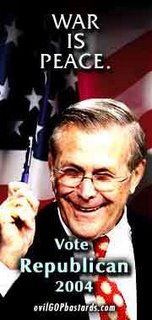 CNN lapped up the following garbage from our former Defense Secretary here (maybe he figured that everyone would be paying so much attention to Wisconsin that no one would notice)...
CNN lapped up the following garbage from our former Defense Secretary here (maybe he figured that everyone would be paying so much attention to Wisconsin that no one would notice)...(Rummy) said there's no evidence to support the premise that the United States is "liked" more now that Obama is president, an idea touted by his supporters.As noted here from last June (the most recent data I could find)...
"No, and I don't think there's data that supports that," Rumsfeld said Sunday on CNN's "State of the Union." "I think he has made a practice of trying to apologize for America. I personally am proud of America."
(Around the world) Obama is broadly popular. Majorities or pluralities in 16 of the 22 countries Pew surveyed expressed at least some confidence in the U.S. president to do the right thing regarding world affairs.Continuing with his CNN nonsense...
This includes 90 percent of Germans, 76 percent of Japanese, and 84 percent of Nigerians. Only 14 percent of Germans, 25 percent of Japanese, and 55 percent of Nigerians expressed confidence in Bush during his last year in office. After a spike in anti-Americanism during the Bush administration, the U.S. image abroad has recovered. America's favorability is now on par with that found at the end of President Bill Clinton's time in office, 1993 to 2001. Responders in 17 of the 21 foreign countries had a positive view of the United States, and favorability improved markedly in Russia, China, and Japan, all key players on the world stage.
He said he's "deeply worried about the budget" and that the country needs to start saving money now.If Rummy had an ounce of common sense (or a tad less egotism), he would know not to "go there." As noted here...
"My goodness, every year the Congress was stuffing $10 billion down the Pentagon's throat that we didn't want," Rumsfeld said. "There's no question that there's money there."
War funding appropriations began skyrocketing under the Bush administration, growing from $10 billion in 2001 to $189 billion in 2008. Facing mounting costs of the ill-considered Iraq invasion, then-Defense Secretary Donald Rumsfeld began using war appropriations as backdoor budgets to disguise the unexpected expenses.Given all of this, I guess it's appropriate that Rummy would call his tome "Known and Unknown," since he's plainly leaving it up to us to decide which is which (and as usual, with no help from the corporate media slaves fawning over him in zombie-like adulation).
Rumsfeld seemed to have become addicted to the secret spending. He realized he could hide other programs in the war bills. Since those bills were theoretically funding “emergency” battlefield requirements, they were barely scrutinized as they were sped through Congress. Without safeguards like due diligence and oversight, Rumsfeld’s Pentagon began routinely categorizing low priority programs as “emergency” necessities.
Update: Oh, and my bad for not noting earlier Rummy's claim that Bushco wouldn't have invaded Iraq without WMD here, when this tells us that Former President Highest Disapproval Rating In Gallup Poll History was plainly intent on doing so regardless, claiming that Saddam Hussein "would still have the capacity to make weapons of mass destruction" (lather, rinse, repeat - sigh).
No comments:
Post a Comment